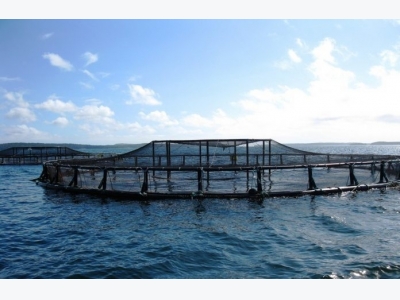6 Good, Bad and Surprising Facts About Aquaculture

As the human population continues to balloon, we’ll soon need a larger and more sustainable source of food to feed ourselves—and one that isn’t so detrimental to the environment.
Aquaculture, better known as fish farming, may be the solution. It can help produce healthy and nutritious food, while also contributing a number of benefits to the environment—but only if done correctly. However, it can also do a lot of harm in the hands of a solely profit-driven company, which is why it’s important to understand all sides of the industry.
We look at some of the good, bad and surprising facts about aquaculture to give you a better understanding of the practice as a whole.
Most of America’s Fish Come From Farms
Chances are that if you live in the U.S., you’ve consumed your fair share of fish-farmed seafood. Over 50% of the seafood sold in America comes from fish farms and that number is predicted to rise in future years. With an increasing need for high-protein food sources, fish farming is one of the only sustainable methods that can produce high volumes of product without being terrible for the environment.
There's No Such Thing as “Zero Impact”
While ethical and sustainable aquaculture has been on the rise, there is no such thing as having a zero-impact facility. Whenever you introduce new infrastructure into an otherwise untouched environment, there will be some sort of impact. What companies like Regal Springs do, though, is reinvest into the environment to ensure the impact they do have is positive. This means that they reinvest their profits into the local economies of their locations by working with the people and the government to better the local environment.
Fish Farming is Viewed Negatively
We wish it wasn't so, but the truth is that a handful of corporations have brought significant negative light to an otherwise sustainable and ethical business model. After seeing these certain companies' practices and by claiming fish farming is disastrous, media outlets began to sway public opinion against aquaculture, despite it being a responsible method of sustaining the growing global demand of seafood. There are definitely companies from around the world that don’t have the same morals as progressive companies, but that shouldn't mean that all are condemned—do your research first!
It’s the Largest Growing Animal Food Producing Sector
Considering that the world’s population is growing, the need for highly nutritious seafood is at an all-time high. Aquaculture has done a lot to meet the skyrocketing need and by doing so it has become the fastest-growing sector in the food industry. With the added stress of climate change, fish farming may have to take on more and more of the market share when it comes to seafood.
It Can Be Toxic
If done poorly, aquaculture have a damaging impact on the environment as a whole. Some farms opt to use chemicals to protect their “crop.” These chemicals damage the waters, impacting all life inside. Not only that, but any diseases that are found in farmed fish can be easily transmitted to wild fish. However, if fish farming is practiced responsibly, these concerns can be eliminated.
If Done Properly, It Can Make A Huge Difference
Fishing can be devastating to the environment, but if aquaculture is done correctly, it can actually be beneficial to the ecosystem. In a time where need is at an all-time high and supply is decreasing, fish farming can help supply product but also keep our water and the surrounding environment safe. The sustainable practice puts less of a strain on valuable resources (like land) and if left in the hands of progressive and ethical companies, the practice will remain a viable source for our seafood needs.
With the demand for sustainable sources of food growing each day, aquaculture is an industry that is seeing tremendous growth. There are both pros and cons to the practice, but if done correctly, aquaculture will be a sustainable and reliable source of seafood for years to come.
Feature Image: NOAA’s National Ocean Service
Related news
 What is Aquaculture? 5 Facts You Should Know
What is Aquaculture? 5 Facts You Should Know Aquaculture, also known as fish farming, is the farming of aquatic organisms such as fish, crustaceans, molluscs and aquatic plants.
 What is Aquaculture? A Brief History of Fish Farming
What is Aquaculture? A Brief History of Fish Farming While some people think that fish farming is a new phenomenon, fish farming has actually been around for thousands of years.
 Aquaculture’s Positive Impact on the World
Aquaculture’s Positive Impact on the World Besides providing a consistent source of food for many communities, aquaculture has an overall positive effect not only on the environment